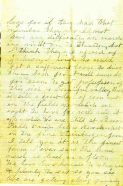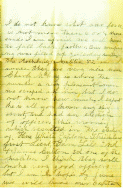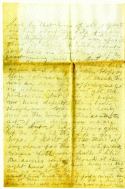Letter to Moffett Brooks' aunt
Summary:
Moffett Brooks writes that enemy fears of
Stonewall Jackson's forces can explain why Staunton has not been invaded.
He goes on to say that the South will not be "whipped," and that southern
forces need to act now.
ALS
.pp
April 14, 1862
Moffett Brooks to his aunt, April 14, 1862
Notes
Apr. 14th [1]
Near New Market
My Dear Aunt,
We received a
letter from home yesterday
one from aunt Clem
[added: and] one
from Bet[2],
so we had quite
a reading, we had looked
for them for several days
before they came to hand.
The one from home was quite
a family one the, kind I like
only wish they would come a
little oftener, was
glad to hear
you were all as well as usual.
There is no news in camp
of importance, the enemy are
still quiet & I hope they will
stay so until we get our
army better organized, they
are reported to have a large
force between 20 & 25 thousand
but I think that is too
[page 2]
large for if they had that
number they would not
have any difficulty in march
ing right on to
Staunton, but
I think they are afraid of
Jackson,
I wish he could
get a sufficient force to drive
them back for it will never do
for them to get possession of
this rich & beautiful
valley there
is sill a great deal of corn out
in the fields yet which we
ought to have for will ne[added: e]d it
after while. We are still at Parson
Rude's 5 miles below
New Market
on the fine Steinberger Farm.
I tell you it is the finest
farm I ever saw the land
nearly as level as a floor.
We have two houses to stay in
& plenty to eat so you see
we are getting along finely.[3]
[page 3]
I do not know what our force
is not more than 6 or 8 thou
sand. I am afraid we will have
to fall back farther. Our compa
ny was filled up yesterday with
the Rockbridge Malitia 52 in
number they are very nice men
Charly McClung[4]
is among the
number a very pleasant man
we scraped up kin but I do
not know how much, I expect
he is all you know any thing
about, we had an election
of officers this morning
which resulted in the election
of
Hue White
Captain
Strickler
First Lieut,
Sam Lile
2nd
& James Culton
3d one of the
malitia[5]
I think they will
make very good officers
but I am in hopes by June
we will have our Captain
[page 4]
back by that time[6] if all reports
are true about the late fight
in Mississippi but I am afraid
there is some mistake about
it I have no doubt we get a
great many prisoners but I don't
like the thought of falling back
again and I regret the loss of
Gen Johnson for I think he
was an excellent
officer, we get
no papers and cannot get the
particulars but I am in hopes
we have defeated them badly
though our loss is very heavy
now is the time for the South to
act if we delay, now we are
gone but I will never give
up as long as there is a ray of
hope, I don't believe there is
any chance for them to whip us.
We are both very well. I like
the service very well though it is
right hard but I think every one that
can go ought to. Give my respect to
aunt Elvira
and to every
body write soon
for it takes letters so long to come. love
to
you and all the rest.
from your nephew
Moff.
Notes
[1] Although Moffett did not include the year in writing the date, we have determined that he authored this letter in 1862, since he enlisted on March 27. 1862 and died on June 29, 1862.
[2] Aunt Clem, or Clemenza Stuart, lived next to the Brooks and was married to Benjamin Stuart, the brother of Moffett's mother Eleanor Stuart Brooks. In the 1860 Census of Augusta County, she is listed as being thirty years old. "Bet" most likely refers to Betsy Brooks, who appears in the 1860 Census of Augusta County as a twenty-nine year-old living with Silas and Apatia Brooks.
[3] Moffett wrote this letter three weeks after the Confederates' March 23 defeat at Kernstown. The battle significantly weakened the Stonewall Brigade, since of its 1,418 soldiers, 343 were either killed, wounded, or missing. After the battle, Jackson commanded his troops to retreat to Rude's Hill, which is near New Market (Robertson, The Stonewall Brigade, 70-78, 82). Moffett's confusion about the strength of the Federal forces was common. As James Robertson reports, "The men in the ranks were aware that Federals in great strength were pouring through the Valley, but knew little else of the military situation" (The Stonewall Brigade, 84). Unbeknownst to Moffett and his comrades, in Harrisonburg, Virginia, Union General Banks and his force of 19,000 soldiers were waiting to attack Jackson.
[4] C. B. "Charly" McClung became a member of the 4th Virginia Infantry, Company I on April 12, 1862 and was discharged on April 17, 1862 (Robertson, 4th Virginia Infantry, 62).
[5]In April of 1862, the Confederate army was reorganized as a result of the Conscription Act, which extended the enlistments of those already in the army indefinitely and made provisions for drafting men not yet in the service. The Act also allowed soliders to elect their own field officers. As Moffett reports, Company I of the 4th Virginia elected Hugh White as its captain, Givens Brown Strickler as lieutenant (here Moffett's information conflicts with Robertson's, who writes in 4th Virginia Infantry that Strickler was chosen as a second lieutenant in April of 1862), Samuel Harrison Lyle as second lieutenant, James B. Culton, who had just enlisted, as third lieutenant (Robertson, 4th Virginia Infantry 80, 75, 62, 47).Hugh Augustus White (1840-1862), whose brother James was Company I's first captain, enlisted in the 4th Virginia Infantry while a student at Washington College. Prior to being elected captain, White was appointed a sergeant on September 13, 1861. Surprised that he was elected captain, Hugh White accepted the position with a great sense of responsibility. As he wrote to his brother Henry, "Promotion in itself brings neither peace nor happiness, and unless it increases one's usefulness it is a curse. An opportunity is now afforded for exercising a wider influence for good, and if enabled to improve this aright I shall then be happier than before" (quoted by Bean, 111). White was killed on August 30, 1862 at Second Manassas (Robertson, 4th Virginia Infantry, 80).Like White, Givens B. Strickler (1840-1913) enlisted in Company I of the 4th Virginia while a student at Washington College. He was promoted to corporal on June 30, 1861, to first sergeant on September 13, 1861, and to Captain on August 30, 1862. He was captured on July 3, 1863 at Gettysburg, and was imprisoned at Johnson's Island Prison until he wa exchanged on March 14, 1865 (Robertson, 4th Virginia Infantry, 75).Samuel Lyle (1840-1898) was a student at Washington College when he enlisted in June of 1861. He was appointed sergeant on September 13, 1861; promoted to First Lieutenant on August 30, 1862; slightly wounded on November 27, 1863; captured May 12, 1864 at Spotsyvania; and paroled at Fort Deleware Prison on June 15, 1865. He is buried at Timber Ridge Presbyterian Church in Rockbridge County (Robertson, 4th Virginia Infantry, 62).The only officer elected who was not formerly a student at Washington College, James B. Culton was elected third lieutenant when he enlisted on April 12, 1862. He was promoted to Second Lieutenant on August 20, 1862 and and resigned from service on March 16, 1863 (Robertson 47).
[6] Captain Henry Morrison of Company I was captured at the battle of Kernstown on March 23, 1862. He was not exchanged until August 5, 1862.
Works Cited
Bean, W. G. The Liberty Hall Volunteers: Stonewall's College Boys. Charlottesville: The University of Virginia Press, 1964.
"The Civil War Artillery Page" http://www.lib.uchicago.edu/~cjt1/artillery.html. Chuck Ten Brink. Visited April, 1998
Crenshaw, Ollinger. General Lee's College: The Rise and Growth of Washington and Lee University. NY: Random House, 1969.
Denney, Robert E. The Civil War Years: A Day-by-Day Chronicle of the Life of a Nation. NY: Sterling Publishing Co, Inc., 1992.
Driver, Robert. J. 52nd Virginia Infantry. Lynchburg, Va: H. E. Howard, 1986.
Lankford, Nelson D. "Alexander Robinson Boteler." Encylopedia of the Confederacy. Ed. Richard N. Current. NY: Simon & Schuster, 1993. I: 197-8.
McMurry, Richard. M. "Joseph E. Johnston." Encylopedia of the Confederacy. Ed. Richard N. Current. NY: Simon & Schuster, 1993. II: 859-61.
McPherson, James M. The Atlas of the Civil War. New York: Macmillan, 1994.
Robertson, James. 4th Virginia Infantry. Lynchburg, Va.: H.E. Howard, 1982.
—. The Stonewall Brigade. Baton Rouge: Louisiana State University Press, 1963.
Sublett, Charles W. 57th Virginia Infantry. Lynchburg, Va.: H. E. Howard, 1985.
Turner, Charles W. Old Zeus: Life and Letters (1860-'62) of James J. White (Professor of Greek at Washington College 1852-1893, Captain of the Liberty Hall Volunteers 1861-'62). Verona, VA: McClure Printing Company, Inc., 1983.
Wallace, Lee A. 5th Virginia Infantry. Lynchburg, Va.: H. E. Howard, 1988.

